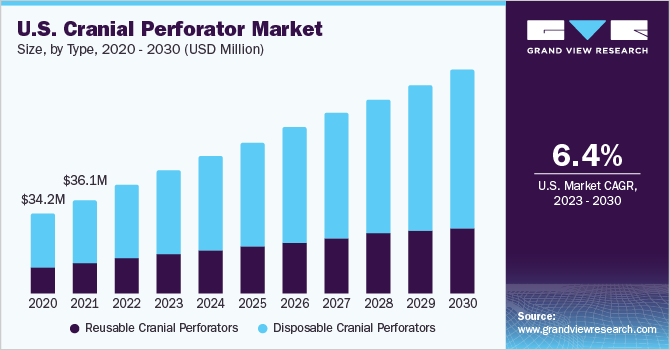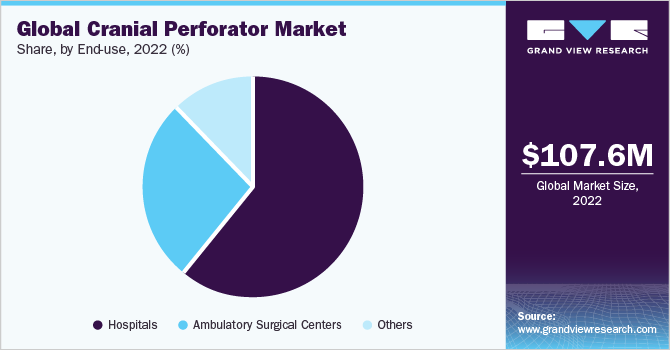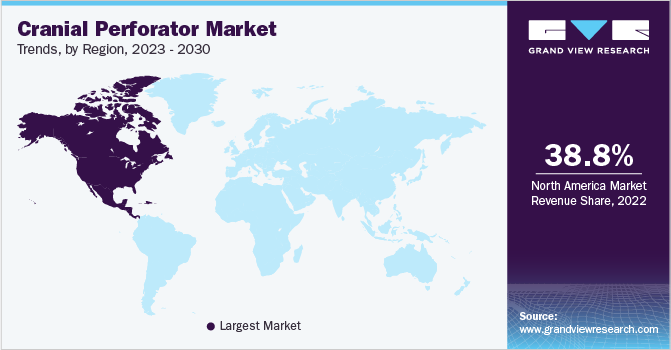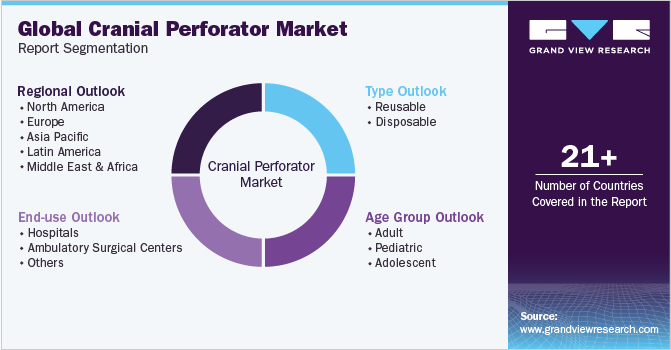
Cranial Perforator Market Size, Share & Trends Analysis Report By Type (Disposable, Reusable), By Age Group (Adult, Pediatric), By End-use (Hospitals, ASCs), By Region, And Segment Forecasts, 2023 - 2030
- Report ID: GVR-4-68040-111-7
- Number of Pages: 150
- Format: Electronic (PDF)
- Historical Range: 2018 - 2021
- Industry:Healthcare
Report Overview
The globalcranial perforator market sizewas estimated atUSD 107.6 million in 2022and is anticipated to grow at a compound annual growth rate (CAGR) of 5.46% from 2023 to 2030.The market growth is attributed to the rising incidence of neurological disorders, advancements in surgical techniques, the rising geriatric population, and continuous R&D in neurosurgical procedures. Moreover, regulatory approvals, favorable reimbursement policies, and healthcare infrastructure significantly contribute to the market's expansion. Cranial perforators are used in various surgical procedures, including burr hole surgeries, craniotomies, and other cranial interventions. The demand for cranial surgeries is steadily increasing due to the rising prevalence of neurological disorders, such as brain tumors, traumatic brain injuries, and intracerebral hemorrhages, which is expected to increase the demand for cranial perforators.

For instance, according to the World Stroke Organization (WSO) report in 2022, there were approximately 3.4 million new intracerebral hemorrhage cases annually worldwide. Notably, about 28% of all incident strokes are intracerebral hemorrhages, and nearly 47% of related deaths occur in individuals under 70 years old. Furthermore, 55% of intracerebral hemorrhage-related deaths are observed in men, with women accounting for 45%. Thus, due to such factors market is anticipated to grow at a rapid pace in the near future. Furthermore, the increasing popularity of minimally invasive surgery in various medical fields will boost product demand. Surgeons and patients alike prefer minimally invasive approaches due to reduced post-operative pain, shorter hospital stays, and faster recovery times.
The market is witnessing a trend of developing instruments designed for less invasive procedures, enabling neurosurgeons to perform delicate surgeries with smaller incisions and minimal tissue disruption. Moreover, minimally invasive cranial perforators contribute to better patient outcomes and improved patient satisfaction. Collaboration between medical device manufacturers, research institutions, and healthcare providers can foster innovation and bring about novel product designs and technologies. Such partnerships can accelerate the development and commercialization of advanced devices. Moreover, supportive regulatory environments that streamline the approval process for new medical devices can encourage manufacturers to invest in product R&D.
Expedited approvals can lead to faster market entry, and the adoption of innovative products will further drive market growth. For instance, in October 2022, the Medtronic Neurovascular Co-Lab Platform was created to help speed much-needed innovation in stroke treatment and care. Their community platform aims to transform ideas and technology into breakthrough global medicines by giving entrepreneurs and physicians insight and care, and, most importantly, ensuring that innovation reaches as many people as possible around the world. As a result, the availability of new treatment choices and an expanding variety of tactics will drive up product demand in the coming years.
The increasing trend ofmedical tourismfor neurosurgical procedures is also likely to create growth opportunities for the product market. Leading medical facilities in developed countries attract patients from around the world, driving the demand for advanced surgical technologies. Furthermore, tailoring cranial perforators to meet individual patient needs can improve surgical outcomes. Customized devices based on patient-specific data can optimize the surgical process and lead to better post-operative results. Thus, due to such factors, the product demand is projected to increase in the near future, thereby supporting the overall market growth.
Type Insights
一次性段占最大的revenue share of 89.8% in 2022. The use of disposable cranial perforators eliminates the risk of cross-contamination and infection transmission, which is a significant concern when reusing instruments. With single-use devices, the chances of surgical site infections (SSIs) are minimized, ultimately benefiting speedy patient recovery. Disposable cranial perforators are pre-sterilized and ready for use, saving valuable operating room time compared to reusable cranial perforators that require reprocessing.
This increased efficiency can lead to shorter surgical procedures, reduced anesthesia exposure, and enhanced patient comfort. Moreover, the traditional cranial perforators were often made fromstainless steeland required sterilization after each use. Disposable cranial perforators have gained popularity due to their single-use nature, offering several advantages for both surgeons and patients due to which, the demand for disposable products will increase in the near future.
Age Group Insights
On the basis of age group, the global industry has been categorized into adult, pediatric, and adolescent. The adult age group segment accounted for the largest share of 52.6% of the overall revenue in 2022. Neurosurgeons, medical device manufacturers, and healthcare providers continue to collaborate and innovate, pushing the boundaries of neurosurgery. Moreover, due to the rising geriatric population, the prevalence of neurological disorders and age-related conditions increases significantly.
Neurosurgical procedures are becoming more common in the adult population as medical science continuously evolves to address complex neurological conditions. Adult cranial perforators serve as essential tools for neurosurgeons to gain access to the brain and perform intricate surgeries with precision and minimal invasiveness. Thus, due to such factors, the demand for cranial perforators will increase in the adult age group segment.
End-use Insights
医院部分占最大的马rket share of 60.4% in 2022. This is due to the increasing hospitalization of patients with neurological disease conditions. According to the National Center for Biotechnology Information (NCBI), each year, 22.6 million people suffer from neurological injuries or disorders, of whom 13.8 million need surgery for their treatment. Thus, the increasing number of neurological hospital admission boost the demand for devices required for surgery, thereby driving segment growth. The availability of technologically advanced cranial perforators, coupled with favorable reimbursement policies, can further enhance segment growth during the forecast period.

For instance, Medtronic offers comprehensive services to secure and maintain coverage & payment for various neurovascular devices. In addition, the increasing number of patients being admitted to hospitals due to therapies, surgeries, and treatments is projected to favor the market growth. Thus, a subsequent rise in the number of patients across the globe, favorable reimbursement policies, and the launch of technologically advanced products are leading to a growing demand for hospital treatments. Ambulatory surgical centers (ASCs) emerged as the second-largest end-use segment.
ASCs present numerous benefits to patients, such as reduced procedure duration and the option for same-day discharge, unlike hospitals. The rising adoption of advanced and less invasive surgical techniques has made ASCs suitable for many neurosurgical procedures. In addition, their cost-effectiveness compared to hospitals leads to substantial savings for patients. Due to these factors, the ASC segment has been experiencing rapid growth.
This expansion can be attributed to shorter procedure times and advancements in minimally invasive surgical approaches. The increasing number of ASCs and the development of modern healthcare facilities are expected to further drive the segment's growth. For example, according to ASC Becker, the United States has close to 5,700 Medicare-certified ASCs. The projected increase in ASCs and growing awareness about the availability & advantages of these medical facilities are expected to fuel the segment growth over the forecast period.
Regional Insights
Based on region, North America accounted for the largest market share of 38.75% in 2022. This can be attributed to the strong presence of companies engaged in developing, manufacturing, and commercializing devices used for diagnosing and treating neurological patients in the region. The region boasts a strong network of specialized medical centers, research institutions, and skilled neurosurgeons. Advancements in computer-assisted navigation, robotic assistance, and imaging technologies have significantly enhanced the precision and safety of neurosurgical procedures, boosting the demand for advanced cranial perforators.

The region’s advanced medical research landscape fosters collaborations between medical device manufacturers, research institutions, and healthcare providers. These partnerships drive innovation in cranial perforators, with an emphasis onpersonalized medicineand patient-specific instruments. Research initiatives are exploring the integration of advanced technologies into cranial perforators, aiming to further improve surgical precision and patient outcomes, therefore, driving the market growth in this region.
Key Companies & Market Share Insights
The market is consolidated and has a strong presence of global as well as regional companies, which primarily emphasize growth strategies, including new product launches, collaborations, partnerships, expansions, and mergers & acquisitions. For instance, in May 2022, Terumo Corporation (Terumo India) established a partnership agreement with Argon Medical, to deliver advanced medical solutions that offer comprehensive patient support from diagnosis to treatment. Some of the prominent players in the global cranial perforator market include:
ACRA-CUT Inc.
Adeor Medical AG
Cranial Cut
Integra LifeSciences (CODMAN)
Nouvag AG
Vitalys Surgical
Micromar Ind. e Com. LTDA
Evonos GmbH & Co. KG
Surtex Instruments Ltd.
Shanghai LZQ Precision Tool
Cranial Perforator Market Report Scope
Report Attribute |
Details |
Market size value in 2023 |
USD 112.8 million |
Revenue forecast in 2030 |
USD 163.7 million |
Growth rate |
CAGR of 5.46% from 2023 to 2030 |
Base year for estimation |
2022 |
Historical data |
2018 - 2021 |
Forecast period |
2023 - 2030 |
Quantitative units |
Revenue in USD million, and CAGR from 2023 to 2030 |
Report coverage |
Revenue forecast, company ranking, competitive landscape, growth factors, and trends |
Segments covered |
Type, age group, end-use, region |
Regional scope |
北美;欧洲;亚太地区;拉丁美洲; MEA |
Country scope |
U.S.; Canada; UK; Germany; France; Italy; Spain; Denmark; Sweden; Norway; Japan; China; India; Australia; South Korea; Thailand; Brazil; Mexico; Argentina; South Africa; Saudi Arabia; UAE; Kuwait |
Key companies profiled |
ACRA-CUT Inc., Adeor Medical AG; Cranial Cut; Integra LifeSciences (CODMAN); Nouvag AG; Vitalys Surgical; Micromar Ind. e Com. LTDA; Shanghai LZQ Precision Tool Co., Ltd.; Evonos GmbH & Co. KG |
Customization scope |
Free report customization (equivalent up to 8 analyst’s working days) with purchase. Addition or alteration to country, regional & segment scope. |
Pricing and purchase options |
Avail customized purchase options to meet your exact research needs.Explore purchase options |
Global Cranial Perforator Market Report Segmentation
This report forecasts revenue growth at global, regional, and country levels and provides an analysis of the latest trends in each of the sub-segments from 2018 to 2030. For this study, Grand View Research has segmented the global cranial perforator market report on the basis of type, age group, end-use, and region:

Type Outlook (Revenue, USD Million, 2018 - 2030)
Reusable
Disposable
Age Group Outlook (Revenue, USD Million, 2018 - 2030)
Adult
Pediatric
Adolescent
End-use Outlook (Revenue, USD Million, 2018 - 2030)
Hospitals
Ambulatory Surgical Centers
Others
Regional Outlook (Revenue, USD Million, 2018 - 2030)
North America
U.S.
Canada
Europe
UK
Germany
法郎e
Italy
Spain
Denmark
Sweden
Norway
Asia Pacific
Japan
China
India
Australia
South Korea
Thailand
拉丁美洲
Brazil
Mexico
Argentina
Middle East & Africa
South Africa
Saudi Arabia
UAE
Kuwait
常见问题关于这个报告
b.The global cranial perforators market was estimated at USD 107.6 million in 2022 and is expected to reach USD 112.8 million in 2023.
b.The global cranial perforators market is expected to grow at a compound annual growth rate of 5.4% from 2023 to 2030 to reach USD 163.7 million by 2030.
b.North America dominated the cranial perforators market with a share of 38.75% in 2022. This can be attributed to the strong presence of companies engaged in developing, manufacturing, and commercializing devices used for diagnosing and treating neurological patients in the region.
b.The growth of the cranial perforators market is due to various factors such as advancements in surgical techniques, increasing prevalence of neurological disorders, a growing aging population, and ongoing research and development in medical technology. Additionally, factors like regulatory approvals, healthcare infrastructure, and reimbursement policies also play a significant role in the market growth.
b.Some key players operating in the cranial perforators market include ACRA-CUT Inc., adeor medical AG Cranial Cut, Integra LifeSciences (CODMAN), Nouvag AG, VITALYS SURGICAL, Micromar Ind. e Com. LTDA, SHANGHAI LZQ PRECISION TOOL CO., LTD , Evonos GmbH & Co. KG, and others





